Employer rescinding job offer letter template
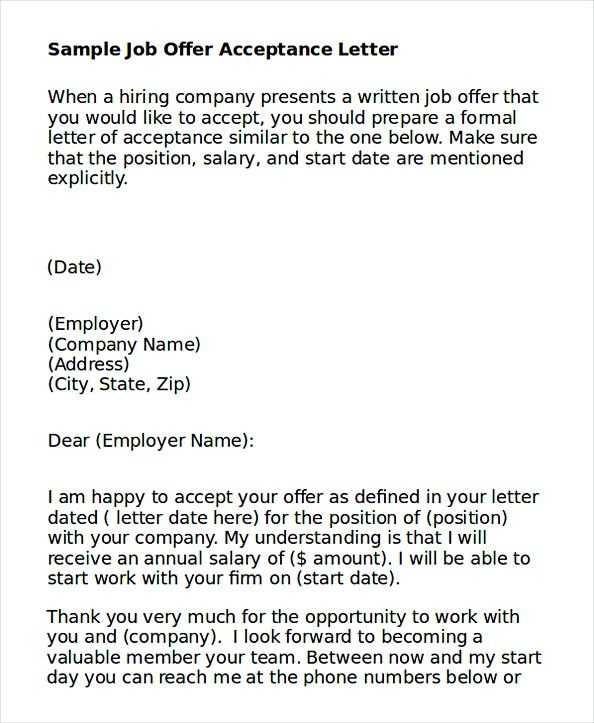
If you need to rescind a job offer, act quickly and communicate the decision professionally. The letter should be clear, direct, and empathetic, ensuring the candidate understands the reasoning without feeling disrespected. Avoid unnecessary details and focus on a respectful tone that reflects the company’s values.
Start with an acknowledgment of the candidate’s interest and the offer made. Then, briefly explain the circumstances leading to the decision. If possible, provide the candidate with a brief understanding of why the offer is being revoked, keeping it concise but transparent. A well-crafted letter will maintain the relationship and help avoid potential legal repercussions.
In the closing, express regret for any inconvenience the candidate may experience and offer assistance if needed. If the company is open to future opportunities, let the candidate know. This keeps the door open for potential collaborations down the line, while still handling the current situation tactfully.
- Employer Rescinding Job Offer Letter Template
When an employer rescinds a job offer, it’s critical to communicate the decision clearly and professionally. Below is a template that can guide you through the process of informing the candidate with respect and transparency.
Template for Rescinding a Job Offer
[Employer’s Name]
[Company Name]
[Company Address]
[City, State, ZIP Code]
[Date]
[Candidate’s Name]
[Candidate’s Address]
[City, State, ZIP Code]
Dear [Candidate’s Name],
We regret to inform you that we must rescind the job offer for the position of [Job Title] at [Company Name], which was extended to you on [Date of Original Offer]. Due to [reason for rescinding offer], we are unable to proceed with your employment at this time. We understand that this news may come as a disappointment, and we apologize for any inconvenience caused.
We greatly appreciate the time and effort you put into the interview process, and we remain impressed with your qualifications. Unfortunately, circumstances beyond our control have led to this difficult decision.
If you have any questions or would like to discuss this matter further, please don’t hesitate to reach out to [Contact Information]. We wish you the best in your future endeavors.
Sincerely,
[Your Name]
[Your Position]
[Company Name]
Key Points to Include in the Letter
| Section | Details |
|---|---|
| Salutation | Use a polite, respectful greeting. |
| Reason for Rescinding | Clearly state why the offer is being rescinded (e.g., business circumstances, funding changes, etc.). |
| Apology and Acknowledgment | Express regret for the situation and show understanding of the potential impact on the candidate. |
| Contact Information | Offer the opportunity for further communication and provide contact details. |
Being direct but compassionate in your communication can help preserve a professional relationship, despite the unfortunate circumstances of rescinding an offer.
Withdrawing a job offer can expose an employer to potential legal consequences, depending on the circumstances surrounding the withdrawal. It’s important to be aware of the legal implications that could arise, especially if the candidate has already relied on the offer to their detriment, such as quitting a current job or relocating. Such actions might give rise to claims of “detrimental reliance” or “promissory estoppel,” where the candidate argues that they suffered a loss based on the promise of employment.
Contractual Implications
If the job offer was made in writing and included specific terms or conditions, withdrawing it may breach a legally binding agreement. In some jurisdictions, this could lead to claims for damages or specific performance. Employers should ensure that job offer letters clearly state whether the offer is contingent on certain conditions, such as background checks or drug tests, to minimize any risks of unintended obligations.
Employment Laws and Protections
Some regions have specific protections for job candidates, especially under anti-discrimination laws. If the withdrawal of the offer is seen as based on discriminatory factors, such as race, gender, or disability, the employer could face legal action. Employers should always ensure that their decision to revoke an offer is non-discriminatory and justifiable based on objective reasons.
Begin the letter by clearly stating the withdrawal of the job offer. Indicate the job title, the company name, and the specific date of the offer. This helps eliminate any ambiguity about which position and offer you are referencing.
Reason for Withdrawal
Briefly mention why the offer is being rescinded. While the reason can be left general, providing a clear explanation will help the candidate understand the decision. Avoid over-explaining or including irrelevant details.
Apologize and Show Consideration
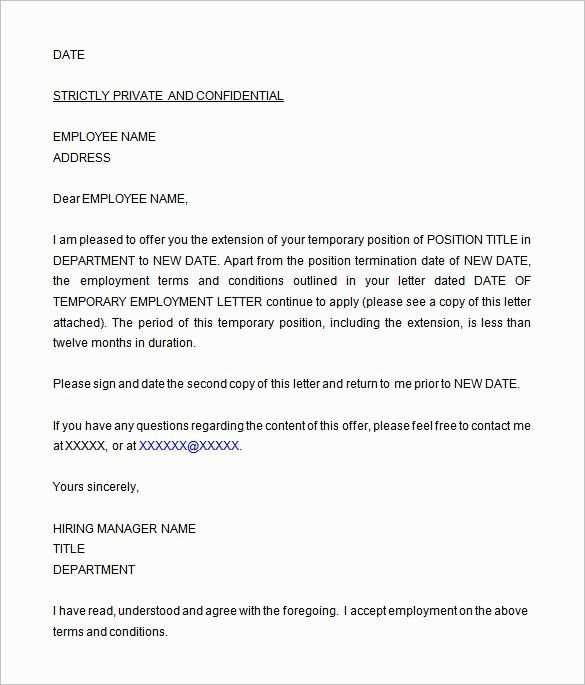
Acknowledge the impact of this decision on the candidate. A short and sincere apology will demonstrate respect for their time and expectations, maintaining a professional relationship despite the unfortunate turn of events.
Conclude the letter by offering your contact information for any follow-up questions. This demonstrates openness and transparency and allows the candidate to seek clarification if needed.
Employers may need to cancel a job offer for several reasons that are beyond the candidate’s control. These can range from internal company changes to external factors influencing business operations.
Financial Constraints or Budget Changes
Sometimes, companies face unexpected financial challenges. Budget cuts or a change in funding may force them to reconsider or rescind job offers. This often happens in cases where the company cannot afford additional hiring due to economic downturns or unforeseen financial pressures.
Failed Background Check or Verification Issues
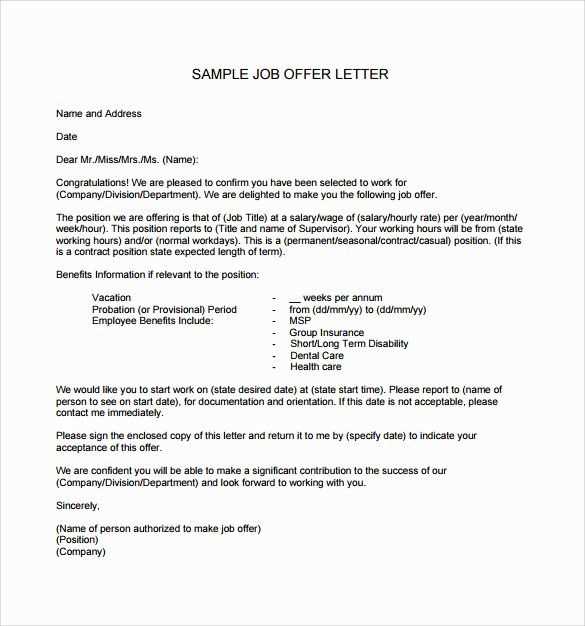
If a candidate fails to pass a background check or there are discrepancies in the information provided during the hiring process, the offer may be canceled. This is especially relevant if the candidate’s qualifications, criminal record, or references do not align with the company’s standards or policies.
- Inaccurate employment history
- False claims regarding education or certifications
- Inconsistent criminal background findings
Shift in Company Strategy or Priorities
Corporate restructuring or shifts in business goals can lead to changes in staffing needs. If a company changes its direction or reduces its workforce requirements, it may rescind offers to fill roles that are no longer necessary.
Unforeseen Personal or Legal Issues
Sometimes, external personal or legal matters arise, such as the candidate being involved in legal trouble or facing personal issues that prevent them from joining the company. These unforeseen circumstances may lead to a retraction of the job offer.
Overqualified Candidate or Poor Job Fit
If the employer realizes that the candidate is overqualified for the role or not a good cultural fit, they might rescind the offer to seek someone better suited for the position. This decision is often made to avoid future dissatisfaction or a mismatch in expectations.
Delayed or Missed Deadlines for Accepting the Offer
If the candidate does not respond within the stipulated timeline or misses the deadline for signing the offer, the employer might decide to cancel the offer and move forward with other candidates.
Notify the candidate promptly once you’ve decided to withdraw the offer. Do so in writing, ideally through email, to keep a clear record of communication. Begin with a clear statement that the offer is being rescinded, including the specific reason behind the decision, if appropriate. This transparency helps prevent misunderstandings and maintains professionalism.
Ensure your tone remains respectful and considerate. Even if the withdrawal is due to circumstances beyond the candidate’s control, acknowledge their time and effort during the hiring process. Avoid negative language or blame, focusing on the situation rather than the individual.
Be brief but firm in your message. Include any necessary details such as timelines, next steps, or possible future considerations. For example, if the withdrawal is due to budget changes or restructuring, mention this clearly without disclosing unnecessary internal specifics.
Always end with an offer to answer any questions and express appreciation for the candidate’s interest in the company. Maintain professionalism and empathy throughout the communication to preserve a positive reputation.
Common Mistakes to Avoid When Rescinding a Job Offer Letter
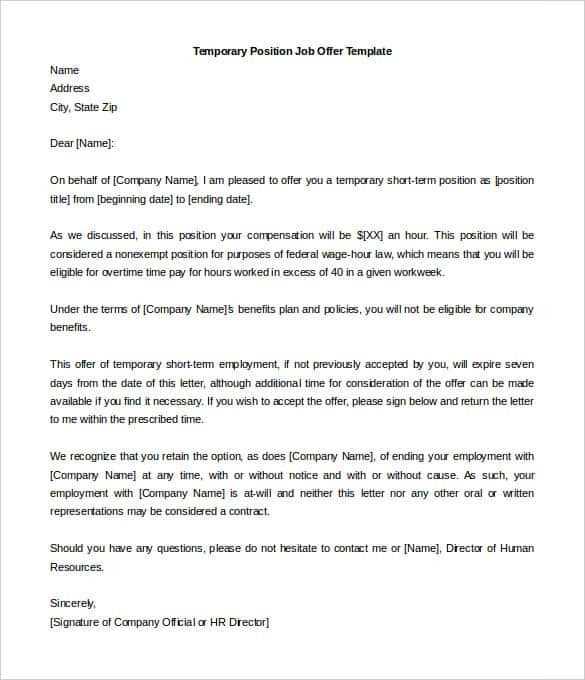
Communicate the decision clearly. Avoid vague language that may leave room for misinterpretation. Be direct in stating the withdrawal of the job offer, without ambiguity or unnecessary explanations.
1. Failing to Provide a Clear Reason
It’s important to offer a brief, professional explanation for rescinding the offer. Avoid being too detailed or personal. A lack of reason can leave the candidate confused or upset, so ensure your reasoning is straightforward and respectful.
2. Delaying the Communication
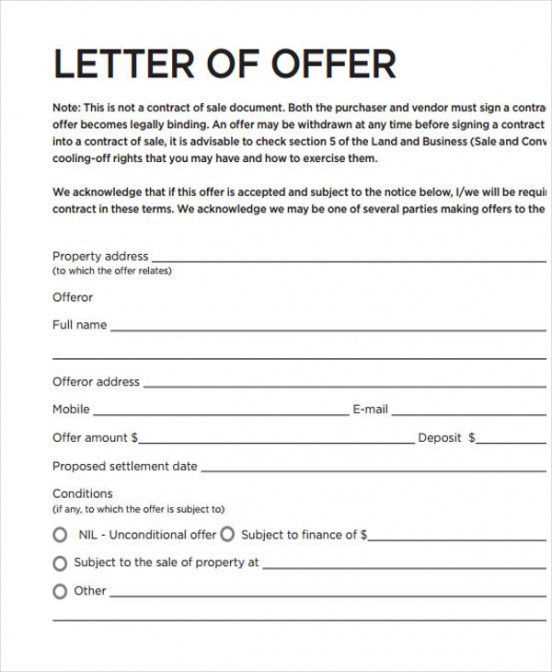
Don’t wait too long to notify the candidate. Rescinding a job offer quickly allows the individual to move forward with other opportunities and avoids unnecessary stress. Prompt communication shows respect for their time.
3. Not Considering Legal Implications
Rescinding an offer may have legal consequences, especially if the offer was accepted and a contract was implied. Check for any binding agreements and understand the legal risks before making the decision. Consult with legal counsel if needed.
4. Not Offering Support or Alternatives
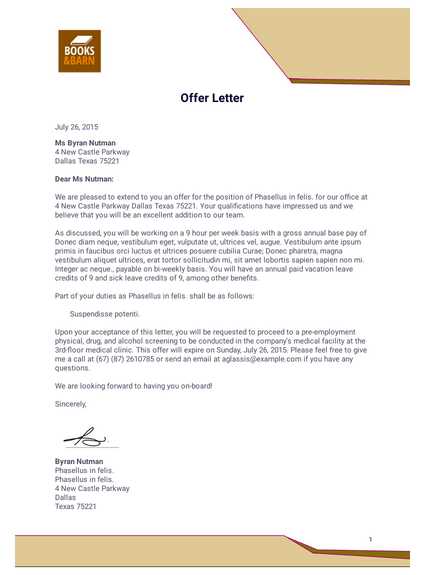
Even if you must withdraw the offer, it’s courteous to offer some support, such as suggesting other positions or providing references. This shows professionalism and maintains a positive relationship with the candidate.
5. Ignoring Emotional Impact
Withdrawing a job offer can be disheartening for the candidate. Be empathetic in your communication. Acknowledge their disappointment and avoid sounding cold or indifferent.
To withdraw a job offer professionally, follow this clear and concise approach. Make sure to address the candidate respectfully, explain the reason for the withdrawal, and express regret while maintaining transparency.
Template for Withdrawing a Job Offer
Dear [Candidate’s Name],
We regret to inform you that we are unable to proceed with the job offer for the position of [Job Title] at [Company Name]. After careful consideration, we have made the difficult decision to retract our offer due to [brief reason, e.g., internal restructuring, budget constraints, or other relevant reason].
We understand that this may be disappointing, and we want to thank you for the time and effort you put into the interview process. We appreciate your interest in our company, and we hope that you will consider us for future opportunities.
We wish you the best of luck in your job search and future career endeavors. Please don’t hesitate to reach out if you have any questions or require further clarification.
Sincerely,
[Your Name]
[Your Job Title]
[Company Name]
[Contact Information]
How to Handle Rescinding a Job Offer: Steps to Follow
Be direct and clear in communicating the decision to withdraw the job offer. It’s essential to avoid any ambiguity to maintain professionalism throughout the process.
- Notify promptly: As soon as the decision is made, inform the candidate. Delays can create confusion and harm the company’s reputation.
- Provide a brief explanation: Offer a concise reason for the change, but avoid excessive detail. Focus on the situation rather than personal shortcomings.
- Offer support: If appropriate, suggest other potential opportunities or resources that might be helpful to the candidate in their job search.
- Follow up in writing: After the initial verbal communication, send a formal letter confirming the decision. This ensures clarity and serves as a record of the action.
- Respect privacy: Do not share the details of the decision with others in the company unless absolutely necessary. Handle the situation discreetly.
By reducing repetition and ensuring clarity, you can manage this sensitive situation professionally and maintain positive relationships with candidates, even when the outcome is not as expected.